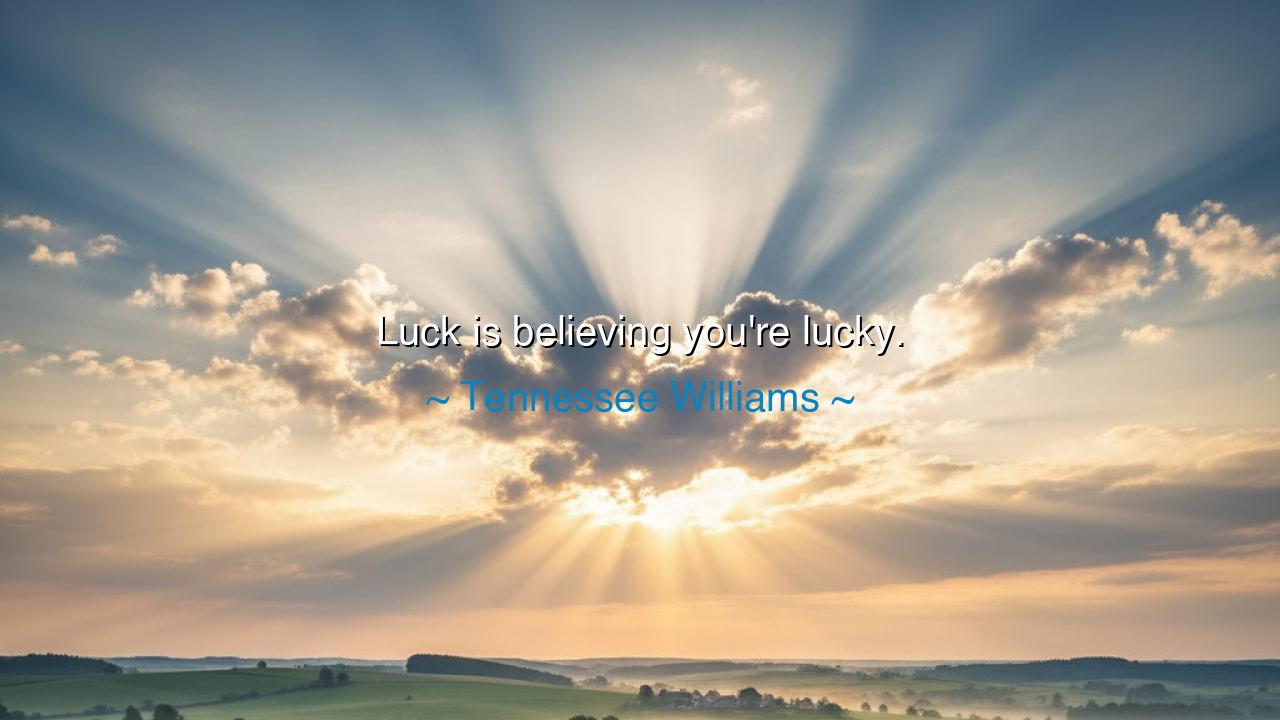
Luck is believing you're lucky.






“Luck is believing you’re lucky.”
Thus declared Tennessee Williams, the tormented poet of the American stage, whose words burned with both fragility and fire. In this short, shimmering phrase lies a truth older than temples and deeper than reason: that belief itself is the source of fortune. Luck, he teaches, is not a coin tossed by fate, nor a favor granted by unseen gods—it is a state of faith, a quiet conviction that the world may yet conspire in your favor. To believe you are lucky is to open the gates through which opportunity flows, to walk as one who expects the wind to fill their sails, even when the sky seems still.
Williams knew of struggle and shadow. His own life was not gilded by ease, but scarred by loss, solitude, and doubt. Yet from that darkness rose works of luminous beauty—A Streetcar Named Desire, The Glass Menagerie—tales of souls who yearned, fell, and rose again. His belief in luck was not the shallow optimism of the naïve, but the hard-won wisdom of one who had faced despair and learned that fortune bends toward faith. When he said “luck is believing you’re lucky,” he was not describing superstition, but mindset—the invisible flame that turns chance into change.
For in the ancient days, the philosophers spoke much the same. The Stoics taught that fortune favors the spirit that stands unbroken; the mystics whispered that the world reflects the heart that beholds it. To believe in luck is to trust the rhythm of the cosmos—to say, “Though I do not see the path, it is there.” Such faith is not arrogance, but harmony. The one who believes they are blessed walks differently, speaks differently, acts with courage—and in that courage, the universe responds.
Consider the story of Thomas Edison, the tireless inventor. When his laboratory burned to ashes, he stood before the flames and said, “There is great value in disaster. All our mistakes are burned up. Thank God we can start anew.” In that moment, he did not curse his misfortune—he believed himself lucky, even amid ruin. And because of that belief, he began again, building what would become the foundations of modern innovation. Edison understood what Williams meant: that luck begins within, that those who believe in their own fortune create it from the ashes of failure.
This is no mere poetry—it is a law of the spirit. The one who believes in bad luck sees only barriers; the one who believes in good fortune sees doors in every wall. The mind, like a mirror, reflects the world it expects to find. To think oneself unlucky is to walk blind beneath the stars, missing the light that was always there. To think oneself lucky is to live in a state of readiness, of gratitude, of faith that turns coincidence into miracle.
Yet beware, for belief without effort is mere fantasy. Williams himself worked endlessly, rewriting, refining, tearing open his soul for the stage. His belief in luck was not a substitute for labor, but the fire that sustained it. Faith without action is smoke without flame. The wise soul marries the two—hope and hard work, belief and endurance—and in that union, true fortune is born.
So let this truth settle deep in your heart: Luck is not something that happens to you—it is something you cultivate. Begin each day with the thought, “I am fortunate to be alive, to try, to create.” Act as if the universe leans gently toward your dreams, and you will find that often, it does. When storms rise, say as Williams might have: “Still, I am lucky.” For faith transforms even adversity into soil where greatness may grow.
And thus, my friend, remember: to believe you are lucky is not to deny hardship, but to declare mastery over it. It is to say, “Whatever comes, I will find the blessing within it.” Walk with that faith, and the world will meet you halfway. For in the end, the luckiest souls are those who choose to be.






AAdministratorAdministrator
Welcome, honored guests. Please leave a comment, we will respond soon